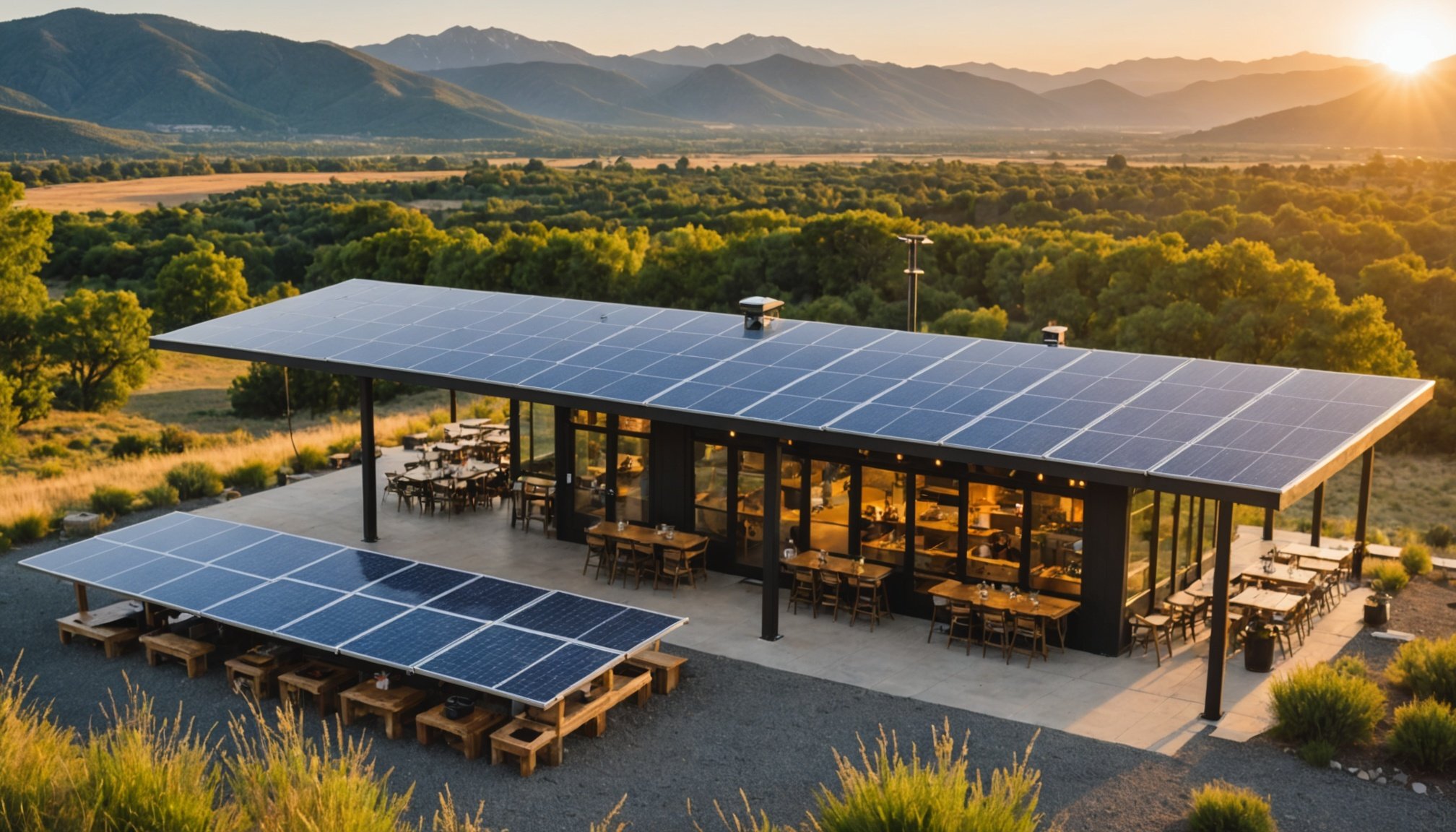Off-grid restaurants face unique challenges in balancing sustainability and operational efficiency. Harnessing solar energy presents a promising solution but comes with its own set of benefits and drawbacks. This guide explores the intricate relationship between solar energy and off-grid dining, offering valuable insights to help restaurant owners make informed choices. Understanding these factors can lead to more sustainable practices while enhancing the overall dining experience. Dive into the complexities of solar power and discover how it can elevate your restaurant’s commitment to sustainability.
Overview of Solar Energy Fundamentals
Solar energy is a form of renewable energy harnessed from the sun's radiation. It is a sustainable energy source that can be converted into electricity or heat, providing a clean alternative to fossil fuels. The principles of solar energy revolve around capturing sunlight and converting it into usable power through various technologies.
Also to read : Mastering food hygiene ratings in the uk: your comprehensive guide to key standards
Photovoltaic Systems
Photovoltaic (PV) systems are a popular method of generating electricity from solar energy. These systems use solar panels composed of semiconductor materials, typically silicon, to convert sunlight directly into electrical power. The efficiency of PV systems has improved significantly, making them a viable option for both residential and commercial applications.
Solar Thermal Energy
Solar thermal energy, on the other hand, involves capturing and using the sun's heat for various applications, such as water heating and space heating. This method is particularly effective in regions with high solar insolation and is often used in conjunction with off-grid power systems to provide energy independence.
Also read : Creative ways to repurpose leftovers: effective cost-saving strategies for restaurants to reduce food waste
The importance of solar energy in promoting sustainable practices cannot be overstated. As a clean and abundant resource, it reduces greenhouse gas emissions and reliance on non-renewable resources. By integrating solar energy into our daily lives, we can contribute to a more sustainable and environmentally friendly future.
Benefits of Solar Energy for Off-Grid Restaurants
Solar energy offers significant advantages for off-grid restaurants, providing both immediate and long-term benefits. One of the primary advantages of solar energy is the reduction in energy costs. By harnessing solar power, restaurants can significantly decrease their reliance on traditional energy sources, leading to substantial financial savings over time. This reduction in operational costs can be particularly beneficial for small businesses operating in remote areas.
In terms of sustainability benefits, solar energy plays a crucial role in minimizing the environmental impact of restaurant operations. By switching to solar power, restaurants can drastically reduce their carbon footprint, contributing to a cleaner and more sustainable environment. This aligns with the growing consumer demand for eco-friendly business practices.
Moreover, solar energy enhances energy independence and reliability. Off-grid restaurants often face challenges with consistent energy supply, especially in remote locations. Solar installations provide a stable and reliable energy source, ensuring continuous operations without the unpredictability of traditional power grids. This independence not only improves operational efficiency but also offers peace of mind to restaurant owners, knowing that their energy needs are secured through sustainable means.
Drawbacks of Solar Energy for Off-Grid Restaurants
While solar energy provides numerous benefits, it also comes with certain disadvantages that off-grid restaurants must consider. One significant challenge is the initial investment costs. Installing solar panels and the necessary infrastructure can be expensive, often requiring substantial upfront capital. However, various financing options, such as government incentives and grants, can help mitigate these costs.
Space requirements are another limitation to consider. Solar panels need adequate space to capture sufficient sunlight, which can be a constraint for restaurants with limited outdoor areas. Site-specific considerations, such as shading from nearby buildings or trees, can also impact the effectiveness of solar installations.
Moreover, the potential for energy intermittency poses a challenge. Solar energy production depends heavily on weather conditions and daylight availability, leading to fluctuations in energy supply. This variability can affect the restaurant's operations, especially during cloudy days or at night.
To address these issues, energy storage solutions, like batteries, can be integrated to store excess power generated during peak sunlight hours. However, these storage systems add to the overall cost and complexity of the solar setup, requiring careful planning and investment.
Cost Analysis of Solar Energy Implementation
Implementing solar energy in off-grid restaurants comes with a range of solar energy costs. Initially, the installation involves expenses for solar panels, inverters, and other necessary components. These costs can be substantial, but potential subsidies and tax incentives may alleviate some of the financial burden. Government grants and renewable energy programs often provide financial support, reducing the overall expenditure.
When conducting a financial analysis, it's crucial to consider the return on investment (ROI). Although the initial outlay can be high, the long-term savings on energy bills often justify the investment. By reducing reliance on traditional energy sources, restaurants can achieve significant cost reductions over time. The ROI period varies, but many establishments find that they recoup their investment within a few years.
Comparing long-term savings of solar energy to traditional energy sources reveals distinct advantages. While conventional energy costs can fluctuate and increase, solar energy provides a more stable and predictable financial outlook. This stability enhances financial planning and allows restaurant owners to allocate resources more efficiently.
In summary, while the initial solar energy costs may be daunting, the potential for long-term savings and the availability of financial incentives make solar energy a viable and economically sound choice for off-grid restaurants.
Case Studies of Successful Off-Grid Solar Restaurants
Exploring solar energy case studies reveals valuable insights into how restaurants successfully harness solar power. These success stories highlight innovative strategies and the positive impact on both business performance and community perception.
One notable example is a coastal restaurant in Cornwall, which fully transitioned to solar energy. By installing an array of photovoltaic panels, they not only achieved energy independence but also significantly reduced operational costs. This sustainable shift resonated with eco-conscious customers, enhancing the restaurant’s reputation and attracting a loyal clientele.
Another inspiring case involves a remote mountain restaurant in the Scottish Highlands. Facing frequent power outages, they adopted solar energy coupled with battery storage solutions. This decision ensured a reliable energy supply, enabling uninterrupted service even during adverse weather conditions. The restaurant's commitment to sustainability won the admiration of the local community and boosted its standing as a responsible business.
Key lessons from these implementations include the importance of thorough site assessment and leveraging available incentives to offset initial costs. Moreover, these examples underscore the value of promoting sustainability as a core business ethos, which can drive customer engagement and long-term success. Embracing solar energy not only benefits the environment but also enhances a restaurant’s market position.
Tips for Effective Solar Energy Implementation
Implementing solar energy efficiently requires careful consideration of various factors. Here are some essential solar installation tips to ensure success.
Evaluating Site Suitability and Energy Needs Assessment
Begin by assessing the site for solar potential. Evaluate the amount of sunlight it receives, considering factors like shading from trees or buildings. Conduct an energy needs assessment to determine the required energy output. This ensures that the solar system meets the specific demands of the restaurant, optimising energy efficiency.
Choosing the Right Solar Technology and Equipment
Selecting the appropriate solar technology is crucial. Consider the type of solar panels, such as monocrystalline or polycrystalline, based on efficiency and budget. Choose inverters and batteries that complement the system's capacity. Practical guidance from solar experts can aid in making informed decisions, ensuring the system's longevity and performance.
Maintenance and Monitoring for Optimal Performance
Regular maintenance is vital for maintaining optimal performance. Clean the panels to remove dust and debris, ensuring maximum sunlight absorption. Implement a monitoring system to track energy production and detect any issues promptly. This proactive approach enhances the system's reliability and extends its lifespan, maximising the benefits of solar energy.
Comparing Solar Energy with Alternative Energy Sources
Exploring energy alternatives is crucial for off-grid restaurants aiming for sustainability. Besides solar, other energy sources like wind, biomass, and hydroelectric power provide viable options. Each has unique advantages and potential drawbacks.
Wind energy harnesses kinetic energy from wind currents. It's effective in areas with consistent wind patterns but requires significant space for turbines. Biomass energy utilizes organic materials, offering a reliable energy source. However, it involves ongoing fuel supply and can produce emissions. Hydroelectric power capitalizes on flowing water, delivering consistent energy. Yet, it's site-dependent, requiring proximity to water sources.
When comparing solar vs. other energy sources, solar stands out for its accessibility and low maintenance. It offers a clean, renewable option with decreasing costs due to technological advancements. However, solar energy's dependence on sunlight and initial investment might pose challenges.
Strategic considerations in choosing the best energy mix involve evaluating local resources, environmental impact, and cost implications. Restaurants should assess energy needs, geographical factors, and long-term sustainability goals. Combining solar with other renewable sources can enhance energy reliability and reduce carbon footprints, aligning with eco-friendly practices.






